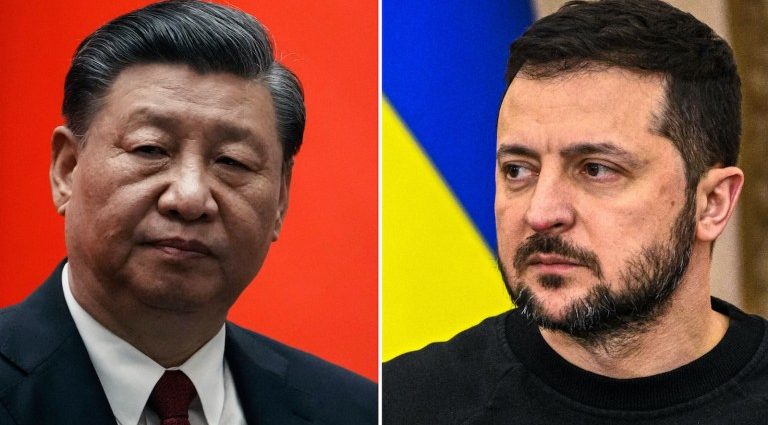China’s President Xi Jinping spoke by phone with Ukraine’s President Volodymyr Zelensky as Beijing tries to set up peace talks with Russia and escape a sense among Western Europeans that it is fully engaged in trying to help Moscow crush Ukraine’s independence.
The hour-long phone call was the first communication between the two leaders since before the war began 14 months ago and China announced its “no limits” partnership with Russia.
China came under intense European criticism after one of its top diplomats, ambassador to France Lu Shaye, suggested that Lithuania, Latvia and Estonia—all former Soviet republics – are not sovereign states at all.
“These countries of the former Soviet Union do not have the effective status in international law, since there is no international agreement that would solidify their status as sovereign countries,” Lu said in a television interview in Paris.
That is the same reasoning used by Russian President Vladimir Putin when he invaded Ukraine, which is an ex-Soviet republic that also wants to join NATO and the EU, like the three Baltic countries did in 2004.
Lu’s comment on the Baltic Sea states also appeared to supplement Beijing’s unwillingness to criticize Moscow’s invasion of Ukraine, which is partly based on the same logic. Russia first objected to Baltic state independence in the 1990s.

Xi may have been spooked by a ferocious European response to Lu’s remarks and saw it fit to backtrack. On Monday, Beijing issued an awkward statement denying that the three Baltic countries are in any way illegitimate.
“Each member republic of the Soviet Union has the status of a sovereign state after the dissolution of the Soviet Union,” declared Mao Ning, a Chinese foreign ministry spokesperson.
Lu’s own embassy said his statement was a personal opinion, not policy. In Beijing, officials said Europe was making “some small things into a big deal,” according to the Chinese state mouthpiece newspaper Global Times.
The uproar threatened China’s long-term goal of putting distance between the US and its European allies.
“Xi’s strategy is to weaken the trans-Atlantic alliance. It was really important for Xi to fix it and fix it fast,” surmised Theresa Fallon, director of the Centre for Russia Europe Asia Studies, based in Brussels.
European reaction – in particular among the Baltic states – reflected its alarm over increasingly bellicose Chinese policy statements. China’s so-called “wolf warrior diplomacy” is usually unleashed to broadcast positions against the United States.
US President Joe Biden’s administration got a taste of “wolf warrior” diplomatic style early in its term in office. In 2021, Yang Liechi, a top Chinese foreign policy official, met with US Secretary of State Anthony Blinken and accused the US of trying to “strangle China.”
”We believe that it is important for the United States to change its own image and to stop advancing its own democracy in the rest of the world,” Yang said.
Last February, China’s then-foreign minister, Wang Yi, answered American complaints about the flight of a suspected Chinese surveillance balloon over US territory by warning, “If the US side continues to fuss over, dramatize and escalate the unintended and isolated incident, it should not expect the Chinese side to flinch.”
The Baltic affair also undercut French President Emmanuel Macron’s effort to wean Europe from generally following Washington’s foreign policy, including its punitive position toward China.
Macron promoted the idea of European foreign decoupling from the US during a visit to Beijing earlier this month. China unsurprisingly favors Macron’s Europe-first proclivities.

But the Baltic dustup seemed to have hardened official Europe’s attitude toward China’s wartime political and economic support for Russia.
EU Commission President Ursula von der Leyen said the Ukraine crisis is currently a key factor in determining the future of EU-China relations. The union’s top diplomat, Josep Borrell, said China’s support for Russia’s Ukraine policy “will determine the quality” of its relations with the EU.
As for the phone call itself, Zelensky described it as “meaningful” while China emphasized the conversation’s “core position” of promoting “peace and talks.”
Xi reiterated his unwillingness to effusively support Russia’s invasion and declared that “mutual respect for sovereignty and territorial integrity” is the “political basis of China-Ukrainian relations.”
Xi also repeated China’s opposition to the use of nuclear weapons. Putin has brandished the nuclear threat against both Ukraine and its European allies.
The further evolution of China’s Ukraine war policy will require some diplomatic acrobatics. China has taken Russia’s side on several issues, not least echoing Moscow’s line by never referring to the invasion as “war.” Instead, Beijing employs Moscow’s official euphemism “special military operation.”
Nor has Beijing described Russia’s attack on Ukraine as an invasion. Rather, China blames the United States and its allies for “stoking” the fire of warfare by supplying arms to Ukrainian defenders.

A report on Chinese government television CGTN said Beijing would send a fact-finding commission to Kiev, the Ukrainian capital, while Zelensky announced he would dispatch an ambassador to Beijing.
Whether negotiations between Russia and Ukraine will follow is unclear. If so, they would require the closure of major, so far insurmountable gaps in their positions.
One key difference: Zelensky has insisted that Russian troops must withdraw without preconditions before talks can take place. Putin says Russia is willing to agree to a ceasefire, but not pull its forces from Ukrainian territory.
How Chinese mediation could resolve this fundamental difference is altogether unclear.

